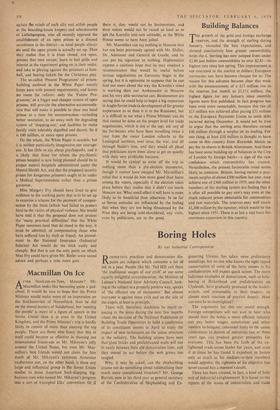Macmillan On Ice
AFTER 'Stockton-on-Tees, Moscow? Mr. Macmillan looks like becoming quite a gad- about. It would be nice to hope that the Prime Minister would make more of an impression on the Stakhanovites of Novosibirsk than he did on the shovel-leaners of Sunderland, but 'meeting the people' is more of a figure of speech in the Soviet Union than it is even in the United Kingdom, and the Prime Minister's trip,is hardly likely to consist of more than meeting the top people. There are those who fancy that this in itself could become as effective in thawing out international freeze-tips as Mr. Mikoyan's jolly around the United States, but even Mr. Mac- millan's best friends would not . claim for him much of Mr. Mikoyan's extrovert Armenian exuberance nor, on the other hand, is there any large and influential group in the Soviet Union similar to those American back-slapping big- business men who turned Mr. Mikoyan's progress into a sort of triumphal Elks' convention. Or if there is, they would not be businessmen, and their voices would not be raised so loud as to jolt the Kremlin into new attitudes, as the White House seems to have been jolted.
Mr. Macmillan can say nothing in Moscow that has not been previously agreed with Mr. Dulles, Dr. Adenauer and General de Gaulle, and he can put his signature to nothing. Diplomatists express a cautious hope that he may conduct a reconnaissance that . would' be useful before serious negotiations on Germany begin in the spring, but it is optimistic to suppose that he can find out more about the way the Kremlin's mind is working than our Ambassador in Moscow and his very able secretariat can. Businessmen are saying that he could help to begin a big expansion in Anglo-Soviet trade (a development of far greater importance to us than it is to the Russians), but it is difficult to see what a Prime Minister can do that cannot be done on the proper level for trade negotiations, which is not at the top; ask any of the fur-buyers who have been travelling twice a year from the cosier London suburbs to the Leningrad auctions, ever since the war, and all through Stalin's time, and they would all plead that politicians leave them alone to get on quietly with their very profitable business.
It would be cynical to write off the trip as nothing more than a pre-election manoeuvre,. though it cannot have escaped Mr. Macmillan's mind that it would do him more good than harm among the voters, especially if the election takes place before they realise that it didn't cut much Moscow ice. What small effect it will have is more likely to be beneficial than otherwise. In so far as Soviet attitudes are influenced by the feeling that when they are not being threatened by the West they are being cold-shouldered, any visits, even by politicians, are to the good.






































 Previous page
Previous page